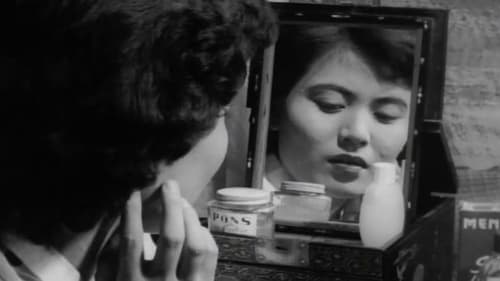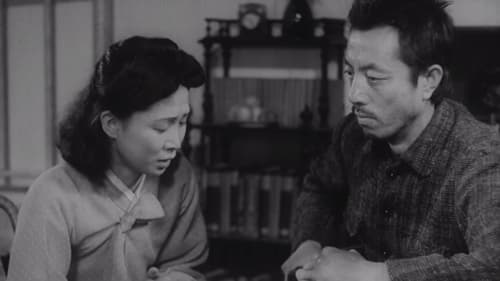Chang-geun Jeon
Nacimiento : 1908-01-18, Hamgyong-bukto, Protectorate Empire of Korea [now North Korea]
Muerte : 1973-01-19

Natasha, an officer at the Soviet Embassy in North Korea, is in love with Seok-bong. But Seok-bong has already planned his wedding with Bok-hui. Natasha grows jealous and threatens Bok-hui to leave somewhere else. Meanwhile Bok-hui's brother, Tae-yeong, is executed after participating in an anti-communist march. Seok-bong is accused of taking a part in the march. Seok-bong starts to feel pessimistic about his communist belief. He tries an escape to the South, but he is captured by the authority and executed.

Director Jeon
Confession of an Actress is about an actor who was once a famous star. He had a daughter with an actress who he loved when he was young. His daughter became a grownup and he sacrificed himself secretly to make his daughter a star.

Clashes between Korean Independence fighters, the retreating Japanese military, the Soviet Army, and bandits at the end of WWII.

A Korean family is separated during the Japanese colonial period and end up in different parts of Asia, and on different sides of the Korean Civil War.

Editor
Kim Chang-su, who participated in the Donghak Movement, escapes to Manchuria after being chased by the Japanese army, finally making his way home. Angered by the assassination of Empress Myeong-seong, he murders a Japanese lieutenant and is sent to jail. He escapes from prison turns his focus on the democratic movement by teaching civilians and organizing Sinminheo (a democratic organization), even changing his name to 'Kim Gu.' After he is imprisoned again, he gets out on parole and goes to China, where he participates in establishing a provisional government from which he can direct the anti-Japanese struggle. Kim Gu goes on to play a part in Yun Bong-gil's deeds in Shanghai, the events at Hongkou Park, the encounter with Jiang Jish, and the establishment of the Korean National Army, and leads the struggle for Korea's independence with warm fraternal love and clear national spirit. When Korea is liberated in August 15, 1945, he returns back to his native land.

Director
Kim Chang-su, who participated in the Donghak Movement, escapes to Manchuria after being chased by the Japanese army, finally making his way home. Angered by the assassination of Empress Myeong-seong, he murders a Japanese lieutenant and is sent to jail. He escapes from prison turns his focus on the democratic movement by teaching civilians and organizing Sinminheo (a democratic organization), even changing his name to 'Kim Gu.' After he is imprisoned again, he gets out on parole and goes to China, where he participates in establishing a provisional government from which he can direct the anti-Japanese struggle. Kim Gu goes on to play a part in Yun Bong-gil's deeds in Shanghai, the events at Hongkou Park, the encounter with Jiang Jish, and the establishment of the Korean National Army, and leads the struggle for Korea's independence with warm fraternal love and clear national spirit. When Korea is liberated in August 15, 1945, he returns back to his native land.

Kim Gu (Changsoo)
Kim Chang-su, who participated in the Donghak Movement, escapes to Manchuria after being chased by the Japanese army, finally making his way home. Angered by the assassination of Empress Myeong-seong, he murders a Japanese lieutenant and is sent to jail. He escapes from prison turns his focus on the democratic movement by teaching civilians and organizing Sinminheo (a democratic organization), even changing his name to 'Kim Gu.' After he is imprisoned again, he gets out on parole and goes to China, where he participates in establishing a provisional government from which he can direct the anti-Japanese struggle. Kim Gu goes on to play a part in Yun Bong-gil's deeds in Shanghai, the events at Hongkou Park, the encounter with Jiang Jish, and the establishment of the Korean National Army, and leads the struggle for Korea's independence with warm fraternal love and clear national spirit. When Korea is liberated in August 15, 1945, he returns back to his native land.

Ahn Jung-geun
At the end of the Joseon Dynasty, shortly after the Eulsa Treaty has been forced to be concluded by Ito Hirobumi and the pro-Japanese courtiers, Japan pressures King Gojong to step down from the throne. Meanwhile, An Jung-geun, who is cultivating men of ability at Samheung school, is deeply impressed by a speech made by An Chang-ho, and heads for Russia to volunteer the army fighting for independence of the country. As both a lieutenant general of the Korean militia and a commander of the Korean expeditionary force in Manchuria, he carries on the independence movement in defiance of Japanese coercion.

Screenplay
At the end of the Joseon Dynasty, shortly after the Eulsa Treaty has been forced to be concluded by Ito Hirobumi and the pro-Japanese courtiers, Japan pressures King Gojong to step down from the throne. Meanwhile, An Jung-geun, who is cultivating men of ability at Samheung school, is deeply impressed by a speech made by An Chang-ho, and heads for Russia to volunteer the army fighting for independence of the country. As both a lieutenant general of the Korean militia and a commander of the Korean expeditionary force in Manchuria, he carries on the independence movement in defiance of Japanese coercion.

Director
At the end of the Joseon Dynasty, shortly after the Eulsa Treaty has been forced to be concluded by Ito Hirobumi and the pro-Japanese courtiers, Japan pressures King Gojong to step down from the throne. Meanwhile, An Jung-geun, who is cultivating men of ability at Samheung school, is deeply impressed by a speech made by An Chang-ho, and heads for Russia to volunteer the army fighting for independence of the country. As both a lieutenant general of the Korean militia and a commander of the Korean expeditionary force in Manchuria, he carries on the independence movement in defiance of Japanese coercion.

Director
A romantic melodrama about a handsome Korean composer who falls for a Hong Kong singer

Screenplay
Prince Kim Chu, last prince of the Silla Kingdom, falls in love with an enemy princess. Because this is not allowed, he must renounce his heredity and retire to Mt. Chiaksan.

Editor
Prince Kim Chu, last prince of the Silla Kingdom, falls in love with an enemy princess. Because this is not allowed, he must renounce his heredity and retire to Mt. Chiaksan.

Director
Prince Kim Chu, last prince of the Silla Kingdom, falls in love with an enemy princess. Because this is not allowed, he must renounce his heredity and retire to Mt. Chiaksan.

Writer
A village youth gets trapped inside a communist hideout with his home made timebomb and must escape before it goes off.

Producer
The only film from female director Park Nam Ok, the melodrama The Widow offers a different perspective of the female experience in postwar Korea, and a woman's struggle between duty and desire. Raising a daughter alone after the war, widow Shin (Lee Min Ja) is much indebted to her late husband's friend Seong Jin (Shin Dong Hun) but resists his romantic advances. Instead, she falls for Taek (Lee Taek Kyun), who is carrying on an affair with Seong Jin's jealous wife (Park Yeong Suk). Shin is willing to give up everything for Taek, but his heart changes again when his girlfriend returns.

Screenplay
Nakdong River is, along with The Street of Sun (1952) and A Bouquet of Thirty Million People (1951), one of the important films made during the Korean War that the Korean Film Archive has rediscovered and made available to the public.

Editor
Nakdong River is, along with The Street of Sun (1952) and A Bouquet of Thirty Million People (1951), one of the important films made during the Korean War that the Korean Film Archive has rediscovered and made available to the public.

Director
Nakdong River is, along with The Street of Sun (1952) and A Bouquet of Thirty Million People (1951), one of the important films made during the Korean War that the Korean Film Archive has rediscovered and made available to the public.

Writer

Editor

Writer

Director

Writer

Editor

Producer

Writer

Director

Writer

Writer
Hurrah! For Freedom (aka Viva Freedom) is a 1946 Korean film directed by Choi In-kyu. It was the first film made in the country after achieving independence from Japan. During the country's occupation Choi was only allowed to make Japan-friendly films, but the plot of Hurrah! For Freedom is distinctly different, telling the story of a Korean resistance fighter in 1945.

Han-joong
Hurrah! For Freedom (aka Viva Freedom) is a 1946 Korean film directed by Choi In-kyu. It was the first film made in the country after achieving independence from Japan. During the country's occupation Choi was only allowed to make Japan-friendly films, but the plot of Hurrah! For Freedom is distinctly different, telling the story of a Korean resistance fighter in 1945.

To resolve the conflict between the Korean and Manchu border villages, the Korean protagonist sets fire to the Korean village and forces the Koreans and Manchus to put out the fire together.

Editor
To resolve the conflict between the Korean and Manchu border villages, the Korean protagonist sets fire to the Korean village and forces the Koreans and Manchus to put out the fire together.

Writer
To resolve the conflict between the Korean and Manchu border villages, the Korean protagonist sets fire to the Korean village and forces the Koreans and Manchus to put out the fire together.

Director
To resolve the conflict between the Korean and Manchu border villages, the Korean protagonist sets fire to the Korean village and forces the Koreans and Manchus to put out the fire together.






















